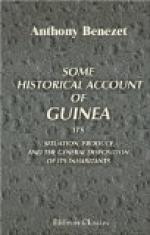[Footnote A: Idem, page 164.]
[Footnote B: M. Adanson, page 161.]
[Footnote C: Idem, page 171.]
[Footnote D: Ibid, page 54.]
[Footnote E: Adanson, page 252, ibid.]
CHAP. II
The Ivory Coast; its soil and produce. The character of the natives misrepresented by some authors. These misrepresentations occasioned by the Europeans having treacherously carried off many of their people. John Smith, surveyor to the African company, his observations thereon. John Snock’s remarks. The Gold Coast and Slave Coast, these have the most European factories, and furnish the greatest number of slaves to the Europeans. Exceeding fertile. The country of Axim, and of Ante. Good account of the inland people Great fishery. Extraordinary trade for slaves. The Slave Coast. The kingdom of Whidah. Fruitful and pleasant. The natives kind and obliging. Very populous. Keep regular markets and fairs. Good order therein. Murder, adultery, and theft severely punished. The King’s revenues. The principal people have an idea of the true God. Commendable care of the poor. Several small governments depend on plunder and the slave trade.
That part of Guinea known by the name of the Grain, and Ivory Coast, comes next in course. This coast extends about five hundred miles. The soil appears by account, to be in general fertile, producing abundance of rice and roots; indigo and cotton thrive without cultivation, and tobacco would be excellent, if carefully manufactured; they have fish in plenty; their flocks greatly increase, and their trees are loaded with fruit. They make a cotton cloth, which sells well on the Coast. In a word, the country is rich, and the commerce advantageous, and might be greatly augmented by such as would cultivate the friendship of the natives. These are represented by some writers as a rude, treacherous people, whilst several other authors of credit give them a very different character, representing them as sensible, courteous and the fairest traders on the coast of Guinea. In the Collection, they are said[A] to be averse to drinking to excess, and such as do, are severely punished by the King’s order: On enquiry why there is such a disagreement




